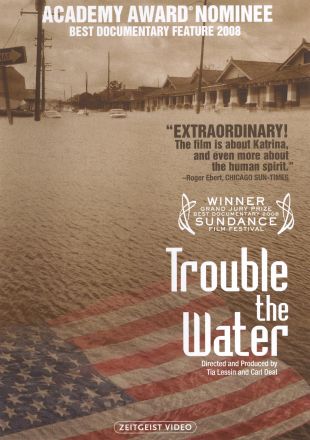
When Hurricane Katrina hit New Orleans, LA, in the late summer of 2005, it was a disaster that seemed to have no end. A Category Five storm would be enough to level most neighborhoods all by itself, but after the city's levee system failed, most of the Crescent City went under water, and the dangerous incompetence of the Federal Emergency Management Agency's response to the crisis led to a tragedy that's still slowly unfolding three years later. Many of the neighborhoods hardest hit by Katrina are still waiting to be rebuilt, and many families that called New Orleans home for generations have left the city, never to return. It's a story that covers a huge canvas, and when Spike Lee set out to make a documentary about New Orleans in the aftermath of Katrina, When the Levees Broke clocked in at a whopping four hours. Filmmakers Tia Lessin and Carl Deal have taken a very different approach to the same story, working on a much smaller scale with their documentary Trouble the Water, and they've created something nearly as affecting as Lee's superb film by allowing us -- at times forcing us -- to see the devastation of Katrina through the eyes of one couple living in New Orleans' Ninth Ward.
Most of the first ten minutes of Trouble the Water is taken from camcorder footage shot by Kimberly Rivers Roberts, a woman living in a poor neighborhood in New Orleans. While city officials warned residents to evacuate their homes in the days before Katrina rolled into Louisiana, no provisions were made for people who didn't have cars or the money to pay for a trip out of town, and Kim and most of her neighbors were just the sort of folks marginalized by this flaw in the city's emergency plan. At first, Kim and the others on her street seem to take the imminent crisis in stride -- they've seen storms before, and expect to see them again -- but it isn't long before everyone realizes Katrina is far more than they bargained for. For the next 90 minutes, Lessin and Deal cut back and forth between Kim's rough but harrowing video of the storm and their journey out of New Orleans and footage shot by Lessin and Deal as Kim and her husband, Scott Roberts, try to rebuild their lives and later revisit what's left of the city they loved (when Kim and Scott arrive in Memphis, TN, to stay with family, Scott admits on camera that it's the first time he's ever been out of Louisiana). In some respects, Kim and Scott Roberts seem to typify the accepted profile of people who got lost in the shuffle after Hurricane Katrina -- they're low-income African-Americans who couldn't afford the emergency plan they were expected to have and were left stranded to deal with both the weather and FEMA. But Kim and Scott are also among the relatively lucky ones; they eventually made it out of their attic, got out of town, and lived to tell their story. And as Trouble the Water goes along, bit by bit we learn more about Kim and Scott and how quietly remarkable their lives have been. Kim was orphaned as a teenager when her mother succumbed to AIDS and for a while she supported herself as a crack dealer before leaving behind her life of crime and embracing Christianity; she's a fascinating mixture of straight-up ghetto attitude and deeply sincere spiritual compassion, and can quote scripture from memory as well as dropping hardcore rhymes as her alter ego, "Black Kold Madina." And though Scott doesn't has as dramatic a tale to tell, he's heroic without calling attention to himself when he has to help rescue his wife and their friends, and there's a moment near the end of the movie where he speaks with quiet satisfaction about his new job and radiates a gratitude that's too real not to move anyone with a pulse. As we grow to admire and respect the strength of the survivors of Katrina, it's all but impossible not to be outraged at the callous disrespect and lack of concern that meets them at nearly every turn from the authorities who are supposed to help and protect them; more than one person wonders aloud if anyone has realized that they happen to be American citizens with rights and freedoms.

Trouble the Water doesn't shy away from the larger story of what happened in New Orleans (and what continues to happen), with blame squarely pointed where it belongs -- at the people who in a time of crisis failed to step forward and help those who needed it the most. But while that's a story that can't be told enough, it's also one that's been told before, and what makes Trouble the Water something unique is the drama, tragedy, and resilience Tia Lessin and Carl Deal find in the lives of Kim and Scott Roberts, people who are both ordinary and heroic as they struggle through what starts as a natural disaster and evolves into something even more devastating. And while Kim and Scott survived Katrina, Trouble the Water never lets us forget how much they and so many others like them lost in the summer of 2005...and will never get back.
